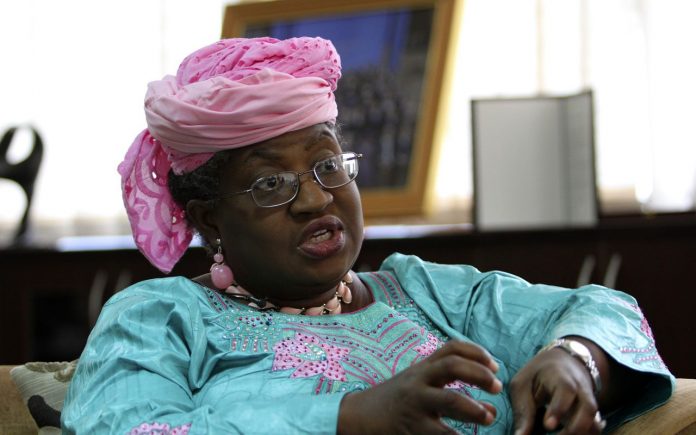The Director General of the World Trade Organisation (WTO), Dr Ngozi Okonjo-Iweala, has admonished African leaders to look past the era of waiting to receive aid from developed nations and instead be creative with the domestic resources available in the continent.
News360 Info reports that United States President Donald Trump recently announced the suspension of United States Agency for International Development (USAID) activities across the world, citing financial mismanagement.
This development comes following United States Republican lawmaker, Scott Perry, alleged that USAID funds were used to arm Boko Haram terrorist organizations.
Addressing journalists at the headquarters of the African Union in Addis Ababa, Ethiopia, Nigerian former finance minister, Okonjo-Iweala commented on the development, stating that African leaders must look inward for funding opportunities for the continent.
The former World Bank developmental economist emphasizes that Africa must shift its perspective to recognize opportunities amid the challenges posed by the suspension of billions of dollars in global funding for health and education initiatives in various countries.
Okonjo-Iweala asserted that African leaders need to focus on attracting investment and mobilizing resources to navigate the current social and economic realities influenced by the policies of the Trump administration.
She said: One of the key things that is emanating is a recognition of the present very difficult geopolitical context we are in. And of course, as the head of the WTO, I am right in the middle of it. But one thing is very clear.
“Africa, really, we really need to change our mindset. Access to aid, I think we can begin to think of it as a thing of the past. We really have to focus on two things: attracting investment and mobilizing our own domestic resources.
“And I think that is a theme that is running through almost all the meetings here at the AU. I think African leaders are recognizing that this is a challenge. But we can also see it as an opportunity.
“And again, I’m glad to say that it’s emerging that look, this could be looked at as an opportunity. This morning, we had a session with the Multilateral Development Bank Association of Africa itself, along with President Mahama. One of the things we talked about is how do we better mobilize our own resources on the continent to invest in ourselves. I pointed out that we have about $250 billion worth of pension funds resources on the continent, which we need to find a way to tap.”
We Have The Institutions, Capitalize On Them – Okonjo-Iweala Stressed
The WTO boss stressed that Africa must capitalize on its institutions and properly channel its resources for development instead waiting to be helped.
Okonjo-Iweala added: “First, the pension funds need to look at their regulations to see how they change it so that they can invest more on the continent rather than investing more outside. And pension funds from South Africa is the biggest, but you have South Africa, Nigeria, Kenya, Morocco, Botswana, Namibia, and many other countries.
“When you start totalling the resources, it’s huge, hugely significant. 250 billion is the estimate that I have. We have these multilateral development banks like the African Finance Corporation. Afrexim Bank is chairing the Association of African Multilateral Institutions.
“We need to capitalize on them better. Instead of looking outside to see what we can get, we have our own institutions. The shareholders are the African governments. Capitalize them properly so that their balance sheet can expand.
“They have a combined balance sheet now of about 70 billion. But if you look at the $70 billion, but if you look at the needs we have for infrastructure alone, up to more than 200 billion a year, you can see that we need to expand these organisations’ balance sheets.
“We have more than 84 national development banks and financial institutions, quite apart from the multilateral.
“How do we mobilize them and capitalize them better so they can help us finance? In Nigeria, during the time I was finance minister, we raised a diaspora bond of $300 million that was quite successful.
“That’s another type of instrument you can tap, tapping resources of our people outside, not just inside the continent. So there are so many creative and innovative ways we can raise resources.
“I want to end by one thing. Another theme going here at the meeting is the realization that we have to better add value and monetize our mineral resources on the continent.”
They Will No Longer Come To Dig Our Resource To Process Them Elsewhere
Okonjo Iweala insists that when the proper steps are taken, all the resources being taken out of Africa will henceforth be processed in the continent as these will create more jobs and increase its trade.
She said: “Almost every head of state is talking about large discoveries of lithium, manganese, copper, so many other things that are needed in the manufacture of electric batteries and vehicles.
“They are found on this continent. The issue is how do we attract the right investments so they add value? They don’t come to dig up, mine the resources and get them processed elsewhere. They have to be processed on the continent to create more jobs for us and to increase our trade.
“The only way we are going to be able to finance ourselves is to grow our economies, trade more, add value to our products, and trade more. And at the WTO, we’re trying to see what are those barriers that are preventing us sometimes when we add value, we can’t export it the way we want.
“What are those barriers? And we have a unique opportunity at our 14th ministerial next year, which will be in Cameroon, for Africa to articulate those barriers.
“And for us at the WTO to work hard to make sure that we lower them so we can have a better percentage of world trade and a better percentage of intra-Africa trade.”






